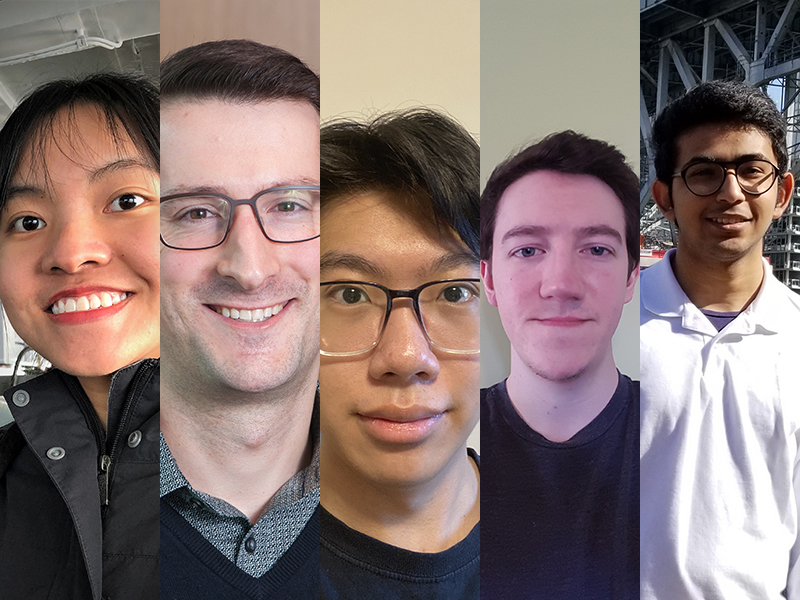How can artificial intelligence (AI) and machine learning bring solutions to challenges posed by the COVID-19 pandemic?
That was the challenge for Computer Systems Technology (CST) Diploma Artificial Intelligence and Machine Learning (AIML) Option student teams, as well as students in a new part-time course on AI, which was supported by Athena Pathways*.
Over six weeks, the students developed their solution as part of a course project. Two teams recently presented their products to a select audience, including the Dean of the School of Computing and Academic Studies.
“Artificial intelligence and machine learning systems already have a wide range of applications such as spam filtering, product recommendation, speech recognition, and autonomous driving,” says Option Head Dr. Chi En Huang. “With the current pandemic, we challenged the students to use real-world open data sets to develop machine learning solutions beneficial to challenges brought on by COVID-19.”
The enforcement of mask-wearing
The first student team’s inspiration came from a team member who, at his side-job, was confronted with customers not complying with the mask-wearing mandate. “The enforcement of mask policies puts extra stress on staff for many businesses,” explains student Spencer Wilson. “So we decided to develop a machine learning model that can accurately identify between someone wearing a mask correctly, incorrectly, and no mask at all.”

The students used a ‘Convolutional Neural Network‘ to analyze images and detect patterns. They trained their model on pictures of faces with correctly worn masks, incorrectly worn masks and without masks.
“Implementing a mask detection system is completely feasible”
While giving a live demonstration during the presentation, Spencer concludes that their mask detection model has “pretty good accuracy”. “It has some challenges such as maintaining accuracy with multiple faces, but we think that implementing a mask detection system is completely feasible, and we will definitely see more solutions like this in the near future in, for example, nursing homes, airports and hospitals.”
Impact of COVID-19 on mental health
The second student group took a different approach. They developed an interactive tool to identify factors that correlate with call volume at the BC Crisis Centre during COVID-19.
“The extent to which COVID-19 has impacted the mental health of British Columbians hasn’t yet been investigated,” says team member Uyen Nguyen. “We wanted to build a model that best emulates the number of calls to the BC Crisis Centre based on COVID-19 infection rates and other factors.”

Those other factors were available data sets such as daily new COVID-19 cases, monthly unemployment rate, daily mobility data, hours of daylight, and hours of sunshine.
The sum of all this data provided the students with roughly 120 combinations that they used to train their ‘polynomial regression‘ models, in which the relationship between the variables is formed and then cross-validated to determine how well each model predicts call volume compared to the actual call volume.
Ultimately, the students’ best model (select Smooth & Scaled Dataset at ‘Model set’) had a coefficient of determination of 0.69 (for comparison, a coefficient of determination of 1 would have indicated that the regression predictions perfectly fit the real-time data).
“It’s rewarding for the students to showcase what they’ve accomplished in a relatively short time”
So what does this mean in layman’s terms? Team member Calvin Rempel explains: “The best indicators for call volume at the BC crisis centre are COVID-19 cases, unemployment, and hours of daylight. The last variable seems to be somewhat of an anomaly since more sunlight is usually associated with better mental health, but the explanation is that COVID-19 actually peaked in the summer months.”
The third team member Evan Marrow follows up on this: “Two other interesting things that we noticed is that the number of COVID-19 cases alone did not influence call volume. Furthermore, we also found a relationship between the announcements of ending CESB and CERB in early and late September, and an increase in call volume. This suggests that lack of federal support can potentially harm mental health in the BC population,” concludes Evan.
“It’s been a lot of work to get to today,” says Dean Hildebrand, Dean of the School of Computing and Academic Studies, after the presentations. “It’s great to see it all come together. ” And Chi En concludes: “It’s rewarding for the students to showcase what they’ve accomplished in a relatively short time. I look forward to seeing how they apply their skills next – we know there are so many domains as yet untapped by the potential of AI.”
BCIT Computing offers a range of AI courses for different audiences. Interested in having Computing students work on your project idea? Join our Industry Sponsored Student Projects – free for non-profits!
*The Athena Pathways program offers scholarships for eligible women in AI courses and programs.

Excellent article! We are linking to this particularly great article on our website. Keep up the good writing.